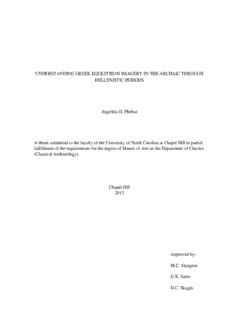
UNDERSTANDING GREEK EQUESTRIAN IMAGERY IN THE ARCHAIC THROUGH HELLENISTIC ... PDF
Preview UNDERSTANDING GREEK EQUESTRIAN IMAGERY IN THE ARCHAIC THROUGH HELLENISTIC ...
UNDERSTANDING GREEK EQUESTRIAN IMAGERY IN THE ARCHAIC THROUGH HELLENISTIC PERIODS Angelina D. Phebus A thesis submitted to the faculty of the University of North Carolina at Chapel Hill in partial fulfillment of the requirements for the degree of Master of Arts in the Department of Classics (Classical Archaeology). Chapel Hill 2013 Approved by: M.C. Sturgeon G.K. Sams D.C. Haggis © 2013 Angelina D. Phebus ALL RIGHTS RESERVED ii. ABSTRACT ANGELINA PHEBUS: Understanding Greek Equestrian Imagery in the Archaic Through Hellenistic Periods (Under the direction of M.C. Sturgeon) This study analyzes equestrian imagery from the Archaic through Hellenistic periods in Greece. I investigate why horse depictions were employed in the contexts of votive offerings, funerary sculpture, and architectural sculpture. I consider whether horses’ renderings can be related to socio-political phenomena respective of their physical and historical context by looking at horses in terms of type, conformation, and scale. While athletic monuments, represented by the Delphi charioteer and the Artemision Horse and Jockey in this project, promote individualism of aristocratic victors through portrait-like depictions of competition horses, Classical reliefs are idealized. Prinias A, the Siphnian Treasury, the Parthenon frieze, and Classical Athenian funerary reliefs show the development of the composite type. The Horse and Groom Relief demonstrates the return to individualized depictions of horses on funerary monuments in the early Hellenistic period. iii. To M.A.H. and N.R.H. iv. ACKNOWLEDGEMENTS While this work bears my name as its primary author, it could not have been completed without the help of many people. First and foremost, Dr. Sturgeon’s expertise and mentorship were invaluable to this research. In addition to guiding me intellectually, her positivity, compassion and encouragement fueled this work. The faculty of the Classics Department at UNC-Chapel Hill, especially Dr. Haggis and Dr. Sams have provided valuable insights, and have helped me to grow intellectually. It is an honor to have the blessing of such a committee. Ms. Horioka and Mr. Bethel of Hedgesville High School, thank you for being the first to believe in me, and for continuing to support me in a variety of capacities though I have been away for so long. I could never have come this far without you. Finally, I could not have completed this thesis without the support of my parents, grandparents, aunts, uncles, and three “little” brothers, Dustin, Eric, and Dominic. Dear friends, there are too many of you to name, but I hope I can offer you a fraction of what you have offered me. v. Table of Contents List of Tables………………………………………………………………………………vii. List of Figures……………………………………………………………………………..viii. List of Abbreviations………………………………………………………………………..x. Chapter 1 ................................................................................................................................... 1 Introduction ........................................................................................................................... 1 Methods ................................................................................................................................. 2 Art in Context ........................................................................................................................ 2 Domestication........................................................................................................................ 3 Skeletal Material and DNA studies ....................................................................................... 5 Horse Types in Greece .......................................................................................................... 8 Asiatic type .......................................................................................................................... 11 Western/ Libyan type .......................................................................................................... 11 European type ...................................................................................................................... 13 Composite type .................................................................................................................... 13 Vase Painting....................................................................................................................... 14 Chapter 2: ................................................................................................................................ 19 Early Horse Votives and Athletic Monuments ................................................................... 19 Athletic Monuments ............................................................................................................ 23 The Delphi Charioteer ......................................................................................................... 27 Olympia Chariot Horse ....................................................................................................... 30 Artemision Horse and Jockey ............................................................................................. 32 Issues of Scale ..................................................................................................................... 34 Chapter 3: ................................................................................................................................ 37 Horses in Relief ................................................................................................................... 37 vi. Prinias Reliefs ..................................................................................................................... 37 Siphnian Treasury ............................................................................................................... 39 Parthenon Frieze .................................................................................................................. 44 The Dexileos Stele, the Berlin Relief, and the Vatican Stele .............................................. 52 Horse and Groom, late 4th c. B.C.E., Athens NM 4464 ...................................................... 54 Chapter 4 ................................................................................................................................. 57 Conclusions ......................................................................................................................... 57 APPENDIX 1: Tables ............................................................................................................. 61 APPENDIX 2: Texts ............................................................................................................... 63 APPENDIX 3: Images ............................................................................................................ 66 Bibliography ......................................................................................................................... 110 vii. LIST OF TABLES Table 1. Examples of horse types in Greek Art……………………………………71 2. Equestrian competition dates…………...……………………………….. 72 viii. LIST OF FIGURES Figures Fig. 1. Modern equids and their facial characteristics………………………………66 Fig. 2. Equine anatomical terms……………………………………………………..67 Fig. 3. Black-figure amphora, Painter of the Vatican Mourner……………………..68 Fig. 4. Black-figure amphora, Painter of the Vatican Mourner……………………..69 Fig. 5. Panathenaic amphora with a chariot race scene……………………………...70 Fig. 6. Attic black-figure neck amphora, Bucci Painter……………………………..71 Fig. 7. Red figure column krater, Painter of the Louvre Centauromachy…………..72 Fig. 8. Attic red-figure volute krater, Painter of the Wooly Satyrs…………………73 Fig. 9. Attic red-figure neck amphora in the manner of the Dinos Painter………….74 Fig. 10. Red-figure neck-handled amphora, Suessula Painter…………………….....75 Fig. 11. Geometric horse votives, Olympia………………………………………….76 Fig. 12. Bronze votives, Olympia……………………………………………………77 Fig. 13. Chariot votives, Olympia……………………………………………………78 Fig. 14. Bronze tripod cauldron with horses on rim-handles………………………...79 Fig. 15. Bronze ring handles with horses, Olympia………………………………….80 Fig. 16. Delphi Charioteer, front and rear views…………………………………….81 Fig. 17. Delphi charioteer, details……………………………………………………82 Fig. 18. Delphi charioteer, detail…………………………………………………….83 Fig. 19. Reconstructions of chariot group, Delphi………………………………......84 Fig. 20. Bronze fragment of a horse, Delphi…………………………………………85 Fig. 21. Chariot Horse Statuette, Olympia…………………………………………...86 ix. Fig. 22. Artemision Horse and Jockey group, Athens……………………………….87 Fig. 23. Artemision Horse and Jockey group, Athens……………………………….88 Fig. 24. Artemision Jockey, detail…………………………………………………...89 Fig. 25. Artemision Horse and Jockey group, study of proportions………………...90 Fig. 26. Artemision Horse, detail……………………………………………………91 Fig. 27. Artemision Horse and Jockey group, front and rear views…………………92 Fig. 28. Relief from Prinias A……………………………………………………….93 Fig. 29. Siphnian Treasury reconstruction of façade, Delphi………………………..94 Fig. 30. East frieze, Siphnian Treasury, Delphi……………………………………..95 Fig. 31. South frieze, Siphnian Treasury, Delphi……………………………………96 Fig. 32. South frieze, Siphnian Treasury, Delphi…………………………………….97 Fig. 33. South frieze, Siphnian Treasury, Delphi…………………………………….98 Fig 34. West frieze, Siphnian Treasury, Delphi……………………………………...99 Fig. 35. West frieze, Siphnian Treasury, Delphi……………………………………100 Fig. 36. West frieze, Parthenon……………………………………………………..101 Fig. 37. North frieze, Parthenon…………………………………………………….102 Fig. 38. North frieze, Parthenon…………………………………………………….103 Fig. 39. Dexileos Relief, Athens……………………………………………………104 Fig. 40. Vatican Relief……………………………………………………………...105 Fig. 41. Berlin Relief……………………………………………………………….106 Fig.42. Horse and Groom Relief, Athens…………………………………………..107 Fig 43. Horse and Groom Relief, Athens…………………………………………..108 Fig. 44. Horse and Groom Relief. Detail of groom…………………………….…..109 x.
Description: